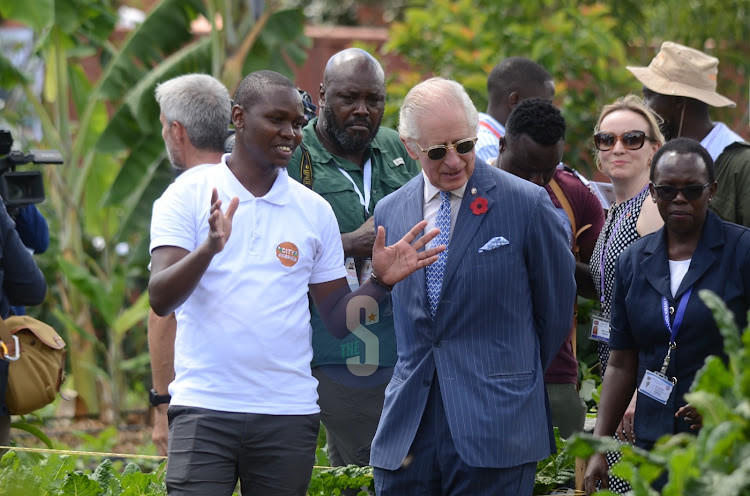King Charles III: The STEP between a Royal Harvest at City Shamba and a Successful Youth in Agribusiness

Nestled amidst the bustling cityscape of Nairobi, Kenya, lies an oasis of innovation – City Shamba. Founded by Gregory Kimani, a former trainer with IITA’s Start Them Early Program (STEP).
City Shamba is a transformative urban agriculture initiative that showcases a medley of cutting-edge technologies tailored for sustainable food production in urban settings. City Shamba finds its home at Mama Lucy Kibaki Hospital in Kayole, Nairobi.
Welissa Mulei and Lorraine Mutinda from the International Institute of Tropical Agriculture (IITA) in Kenya, were received at City Shamba on 14th November 2023. They were joined by a diverse team from City Shamba, some of whom they had previously worked with under the IITA Youth Initiatives i.e STEP and ENABLE TAAT projects.
City Shamba founder Gregory Kimani remarked, “Our organisation was established with the unwavering aim of transforming urban livelihoods by empowering individuals with education, training, and nutritional security. We strive to create exemplary urban gardens in urban centres to enhance food production and play a pivotal role in alleviating hunger and malnutrition by empowering urban communities to adopt and practice urban agriculture wholeheartedly.”
“Our mission is firmly rooted in introducing urban farming as a transformative force that can revolutionise the economics of low-income urban areas. We are committed to constructing and staffing urban agriculture resource and information centres, serving as beacons of knowledge where individuals can access comprehensive training and the necessary resources to embark on their urban farming journeys,” Kimani added.
Stepping into City Shamba is like entering a world of vertical farming ingenuity. Multi-storey structures rise upwards, defying space limitations, while staircase gardens cascade down, transforming every nook and cranny into a verdant haven.
Aquaponic systems dance in harmony with hydroponic setups, fostering a symbiotic relationship between fish, vegetables, and Azolla – a rapidly proliferating aquatic fern that serves as an economical and sustainable solution for livestock and fish feed, as well as a bio-fertilizer.
Amidst this symphony of sustainable practices, black soldier flies diligently work their magic, converting organic waste into valuable feed and manure. Additionally, City Shamba also engages in rabbit and snail farming. Rabbits are raised for their meat and urine, a valuable nitrogen source for fertilizer. Snails are also raised for their meat and slime, which are used in cosmetics and pharmaceuticals.
City Shamba extends its reach beyond its impressive array of technologies by actively engaging with the community. Hands-on training sessions empower individuals, schools, and groups with the knowledge and skills to embark on their own urban agriculture journeys. This ripple effect of knowledge sharing has the potential to transform urban landscapes into self-sustaining food hubs, alleviating hunger and malnutrition.
City Shamba’s impact extends beyond its immediate vicinity.
The farm can expand its reach to various counties in Kenya, amplifying its activity portfolio. By fostering collaborations with local communities, schools, and groups, City Shamba can become a catalyst for the widespread adoption of urban farming practices, transforming urban landscapes into thriving hubs of sustainable food production.
City Shamba’s impact recently captured the attention of a distinguished visitor – King Charles III.
During his historic State visit to Kenya, King Charles graced the farm with his presence, marveling at the ingenuity on display. Accompanied by Prime Cabinet Secretary Musalia Mudavadi, the King harvested spinach, kale, and indigenous vegetables, impressed by the remarkable yields from such a compact space.
City Shamba is a shining example of how urban agriculture can be used to address the challenges of food security, sustainable distribution and production, availability of fresh leafy greens, white meat, and environmental protection in cities. The farm’s innovative technologies and commitment to community engagement make it a model for others to follow.
The Start Them Early Program (STEP), an IITA initiative, integrates agribusiness skills development in its young youth empowerment programme. STEP was launched in 2019 and operates in Secondary Schools across Kenya, DR Congo and Nigeria. STEP promotes hands-on learning through extracurricular clubs, focused on animal farming, crop cultivation, small scale machinery, fish farming, ICT, business and soft skills, value addition, branding and marketing.
The Home Agribusiness initiative, launched in 2020 in response to COVID-19 disruptions, encourages students to practice agriculture at home, with STEP providing training, starter kits, and support.
The aim is to reintegrate youth into agriculture, engaging in hands-on experience in farming activities, offering this as an avenue for income generation, occupying them with productive and creative activities, protecting the environment and instilling a sense of responsibility and community. Pilot agribusinesses are set up in schools and within communities through the home initiative start-ups to demonstrate and act as learning centres for agricultural technologies, including those of the TAAT Programme.
The TAAT Youth in Agribusiness Compact (ENABLE-TAAT), operates in several African countries, engaging youth in comprehensive incubation programs, fostering positive attitudes towards agribusiness and cultivating essential business management skills.
Through the active involvement in piloting and scaling up TAAT’s innovative technologies, young entrepreneurs receive resources and mentorship to launch and grow their ventures. ENABLE TAAT identifies and supports promising youth agribusiness opportunities, striving to transform perceptions of agriculture and encourage young individuals to recognize its potential as a dynamic and rewarding career path.
As urban populations continue to grow, the work of City Shamba and similar initiatives such as the Start Them Early Program (STEP) and ENABLE-TAAT become increasingly vital. They serve as models for transforming urban landscapes into thriving hubs of sustainable food production.
By supporting Youth in Agribusiness Initiatives, we cultivate a future where youth-led ventures flourish, turning landscapes into sustainable hubs of food production and distribution.
KENYA: King Charles III: A Royal Harvest at City Shamba, A Successful Youth Agribusiness | Flickr

